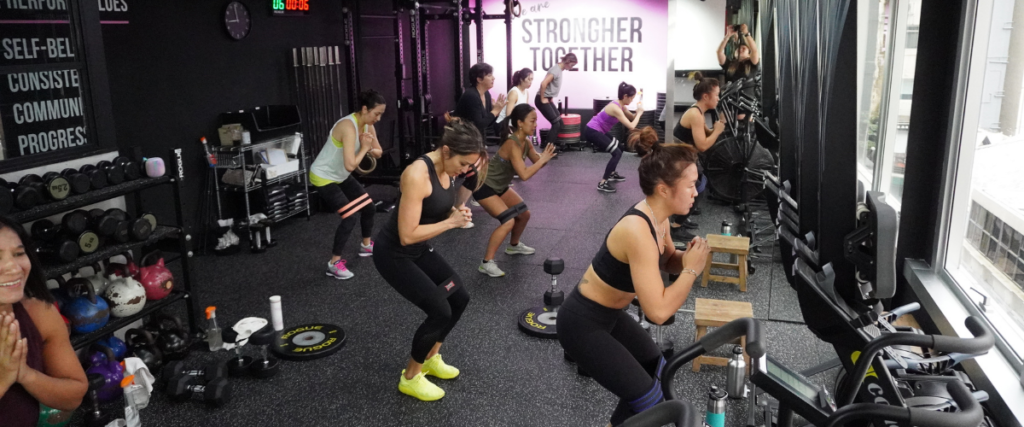Stephanie Poelman, owner and managing director of female-specific training gym Pherform, shares her experiences running a gym that values community and accountability.
Stephanie Poelman is the owner and managing director of female-specific training (FST) gym, Pherform, a well-loved fitness staple in Hong Kong. After moving to Hong Kong to manage the gym, Stephanie purchased the gym soon after, to run it independently. Stephanie takes a hands-on approach to running the gym, from accounting and marketing, to operations and coaching, fostering a deep sense of community and shared accountability.
How did you come to be in this position?
At the end of 2017, I moved to Hong Kong to be the managing director of Pherform. Alex de Fina founded the company, but when I arrived he was already working remotely and looking at either selling or franchising outside of Hong Kong.
As we talked through ownership, my friend said, “Steph, why don’t you purchase the business?” It had always been a goal of mine to own a gym. It actually made the most sense for me to acquire the business. I brought it up to Alex saying I was interested and it was an extremely smooth transition. I loved the day-to-day and the community. I also loved Hong Kong so I bought it.
How did you get started in the fitness industry?
I was in Kuwait for a little over four years, where I set up nine gyms. My background is in HR but I got an opportunity to work with a jump rope company on the side, introducing me to the Crossfit space. I eventually got recruited because my significant other at the time was doing business development for them. They said they wanted to open a female gym and he suggested me, since that is my background within the HR realm. I was able to work in an industry that I’m passionate about.

Does your HR background affect how you run a gym?
I 100% believe that the way I manage and lead my team is directly correlated to my HR background. I have three values that I live by – lead with integrity, leave a legacy, and love with high vibrations.
I had really good mentors in corporate that truly believed in individuals, and I want to have the same impact as they did. I believe that anyone in the fitness industry needs to understand behavioural organisation and styles, because you need to learn how to relate and respond to people. Do you add stress or back off? Do they need a push or a break? If anything, I wish that there was more behavioural or cognitive training that happens within the fitness industry.
What is Female Specific Training (FST)?
Pherform is a female-specific strength and conditioning gym. We offer programming on a daily basis that gives women the structure of different modalities, focusing on conditioning, strength and power, and hypertrophy. Our members are general women getting well-rounded training. Not many are sports-specific, but they want to be leaner, faster, and healthier.
Looking at female physiology, we’ve built a training combination and structure. While you’re recovering one system, you can focus on another. Mondays are conditioning. When you’re recovering from working your cardiovascular respiratory systems, you hit your upper body muscular system on Tuesday, which is hypertrophy. Then on Wednesday, while your upper body is still recovering, we do lifting, for your lower body and focusing on compound movements, and so on.

What is a common misconception in the industry of women-targeted fitness?
There are women who feel that they need to be fit in order to start training, which I think is the biggest misconception. Many women who come in have been sedentary their entire life and are ready for change. At the gym we ask, “What’s stopping you?” Our team lays out the facts – that you don’t need to be fit to start training.
If someone has never paid for a membership before, it’s hard for people to justify the value of it, because they’ve never seen that value before, which is why we always offer them a second opinion – that they are capable of making their health a priority.
Do you think there is a gap in the Hong Kong market for this type of fitness?
The Hong Kong fitness market has always been individual-specific, which means personal training. Someone sets a goal and goes to a trainer who is supposed to bring them there.
We are bridging the gap between goal-based achievement and group environments. At Pherform, you get a quality coach who still gives specific advice. Most women don’t need a specific plan, they need a follow-up plan. The market is saying, you need to work with an individual. We say, be part of a supportive team that can get you to where you want to be; a team that is going to hold you accountable so you put in work. A lot of empathy goes into that. So, I would say there is definitely a market for this type of training service.
What is a new discovery or something that was reinforced for you once you started working at Pherform?
I’ve been working in this field for the last eight years and, originally, I started in FST because of the culture in the Middle East. Many women need to be covered when men are around, so they need a place to train without being covered.
In Hong Kong, female specificity has nothing to do with culture or religion. It opened my eyes, that regardless, women want a space to feel safe and fit their needs from a physiological perspective. For example, it has been proven that women work better with a higher volume of weight, opposed to a higher weight at lower reps. I realised it was a choice to do FST, opposed to a necessity.

You’ve mentioned Pherform’s tight-knit community. How has the community rallied around the gym during the pandemic?
Covid-19 really didn’t impact us, surprisingly. The fitness industry was shut down three times now. Before the first shutdown, I had an inkling we were going to be closed, so we started classes on Zoom the week before the lockdown announcement.
We knew our clients would need more accountability because the chance of training on their own was significantly less. We practiced training through Zoom and when we were actually shut down, we were prepared. We developed our at-home programming – the same exact programme we had but now, at home. The structure never changed, but instead of weights, for example, you could use a 5kg rice bag.
The programming was adjusted to small spaces and limited equipment. We had five Zoom calls a day where one coach would be directing, correcting and motivating, and one coach would demonstrate. It worked really well. For the second shutdown, we did the same exact thing but started lending out equipment. For the third, we went outdoors. I’m so grateful for our coaches and members understanding that we just need to be adaptable during this time.
Can you elaborate more on how Pherform creates a safe space for your clientele?
The first thing we do when someone comes to us is walk them through the process. There is a psychological aspect to it, so once they’ve walked through the door, we create a sense of safety. That’s the biggest thing – walking in and getting clients to feel comfortable to do so. That is why our coaches reach out beforehand, saying, “we will take care of you.”
The safety of a female gym breeds within the community and from our coaches. There are many stories we’ve told ourselves of why we can’t do things. I make sure that every staff member leads with empathy and understanding. From there, we can push the threshold of what they never thought they were capable of.
We have 230 members, and I would say I know 99% of our members. It is important to build that connection and belonging – that is how we build community within the fitness realm. Creating that safe space is so important because we want people to come back. That’s why I think we’re so different from other gyms. When you don’t have that, the intimidation factor kicks in, where people want to go to the gym, but they don’t actually know what to do and they become afraid of judgement.

What is your advice to someone who may not be so comfortable with being in an athletic environment?
The first thing that I would say is to reach out. The second thing is understanding that you’re not alone. Every new person that contacts us is in the same position. They’ve never been in that athletic space before. They don’t know what to expect. They’re unsure of what they can do.
We have a team that’s dedicated. I have a person whose primary responsibility is to just talk to potential members, getting them comfortable and setting their expectations, and realising they don’t have to commit anything. They just need to try it out once and then go from there, and most people want more.
We do consultations with people where we break everything down into lifestyle, nutrition, and training, asking what’s stopping clients from each one. We set small goals, which then turn into habits that we can do over the next 30 days.
What is the most gratifying part of running Pherform?
The way we look at fitness is by creating a community – a group of people who belong and have a common interest. When you’re in a class with someone and you see them on a daily basis, you build connections. We suggest that members introduce themselves to each other to create a sense of camaradarie before workouts. We all have stressors, but the one thing that we’re all doing is prioritising ourselves for one hour a day. The thing that I love the most about fitness is the community aspect, that we hold each other accountable, and feel that we belong.

What is your advice for other entrepreneurs in the fitness, health, and wellness space?
Set your goal and don’t be afraid to tell everyone about it – the more people know, the more likely you will be held accountable. Secondly, get a mentor – someone above you and even people in different industries.
People thought I was entering a very niche market, asking why I wanted to buy a business with a limited number of potential customers. But there are more women in Hong Kong than men. I wasn’t worried about that. I felt like it was my duty.
We have a group called the “Boss Babes” of all the female owners in the fitness industry and we get together on a weekly or bi-weekly basis. There aren’t many of us, but when I took ownership of Pherform, I needed people around me who understand what I’m going through, because being an [acquisition] entrepreneur can be lonely. There’s no one to report to, so getting a mentor to bounce ideas off of is important.
What’s next for Pherform?
We recently moved locations so my short-term goal is to get that up and running. Also, there’s the need for ever-changing adaptability because we are still facing Covid-19. Long-term, I would like to open another location in Singapore – it has a similar demographic of individuals as Hong Kong. However, not being able to travel makes it very hard to go to Singapore and open it up.
The overall goal is to make Pherform a household name, whether you come to the gym or not. We want women to be able to train, focus on their fitness, nutrition, and lifestyle, not just from a physical standpoint but because of the mental clarity that you can get. But we don’t want to franchise. I like the small feeling of a community. When you get to, say, 300 members, you start losing that sense. That’s important for me. I’m not into fitness for the money, I’m into it because I want to have a purpose and I want to be passionate about what I do.

Related Articles
One Man’s Journey: Changing How We Talk About Men’s Mental Health






